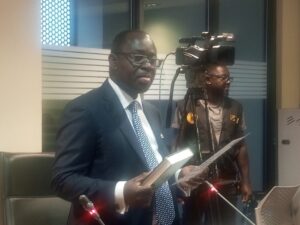Supreme Court is conscience of the nation – Prof Oppong

Professor Richard Frimpong Oppong, an academic and a fellow of the Ghana Academy of Arts and Sciences, a nominee to the Supreme Court, has described the nation’s apex court, the Supreme Court, as the conscience of the nation.
He said the court was “the conscience of the nation” to an extent that it had described itself as a policy court, and in that capacity, played a very important role in the country’s development.
“The Court can certainly deepen the culture of good governance in Ghana, the court can help in the promotion of human rights, improving access to justice and so on and so forth,” Prof Oppong stated during his vetting at the public sitting of the Appointments Committee of Parliament in Accra.
He said this in response to a question by Mr Cletus Avoka, the National Democratic Congress (NDC) Member of Parliament (MP) for Zebilla.
The MP wanted to know from the nominee his philosophy or approach to the interpretation of issues that come before the Supreme Court.
The nominee noted that he would not agree with the premise that he lacked judicial experience or legal practice experience in the country and that he had a very strong reputation in the Ghanaian legal academy.
He said he had been associated with two law firms in the country.
“I have done several cases with the Ghana Arbitration Centre and I actually have about seven cases that I am dealing with now; so, I am not new to the Ghana legal system, I have written extensively on Ghanaian law, so to a large extend although I lived outside, I am not new to the Ghana legal system,” he stated.
He reiterated that getting to the nation’s apex court would take some learning and that he certainly had the capacity to learn.
Prof Oppong said he knew that there were many academics who had gone to the apex court and discharged themselves very well, citing Prof Samuel Kofi Date-Bah and his (the nominee’s) former teacher, Prof Henrietta Mensa-Bonsu.
He was grilled by members of the Committee on diverse areas such as his own publication, dubbed: “Foreign Same-Sex Marriages Before Commonwealth African Courts.”
He assured the committee that when given the nod, he would not be a danger to anti-LGBTQI (lesbian, gay, bisexual, transgender, queer or questioning and intersex) activities because of his research work.
Other areas the committee grilled the nominee on include his dual Ghana-Candian citizenship and his date of birth.
Also, at the Committee’s sitting for vetting on Tuesday, August 13, was another Nominee of the Supreme Court, Justice Sophia Rosseta Bernasko Essah, a Court of Appeal Judge.
Source: GNA
